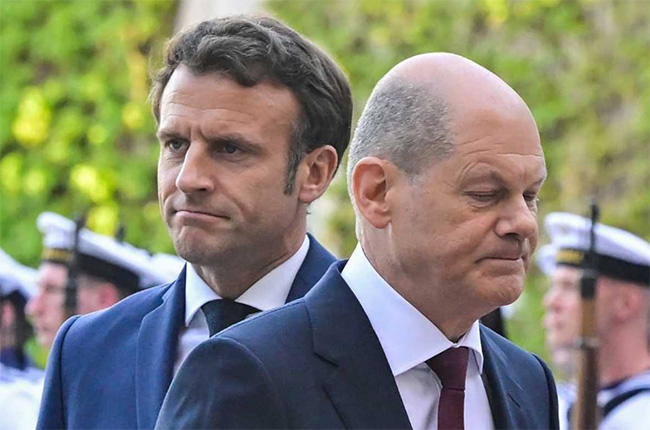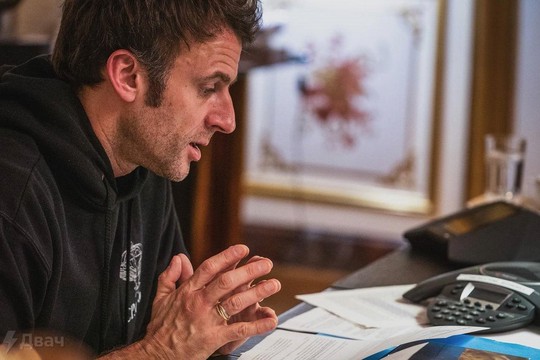French President Emmanuel Macron’s (photo) suggestion that NATO might have to send troops to Ukraine was met with brickbats and catcalls this week, notes POLITICO.
German Chancellor Olaf Scholz led the pack of infuriated hecklers taking issue with Macron’s claim that NATO has ruled nothing out when it comes to dispatching troops. Scholz explicitly stated Western governments had agreed “there will be no ground troops, no soldiers on Ukrainian soil who are sent there from European states or NATO states.”
According to French officials, Macron’s comments were meant to galvanize Western powers and ignite debate over what’s needed to prevent a Russian victory. According to an Elysée aide, they were also meant “to send a strong strategic message to the Russians to say: ‘Don’t do anything stupid.’” (Apparently said without a hint of irony.)
But if the French leader’s remarks were meant to send a firm warning to the Kremlin, they failed spectacularly — in fact, they achieved the complete opposite. To the Kremlin’s chortling delight, Macron’s comments exposed Western splits and rifts, communicating panic over the military state of play in Ukraine.
It also handed Russian President Vladimir Putin a great propaganda opportunity to reinforce the time-worn narrative for his groomed domestic audience that the West — nowadays represented by NATO — wants to destroy Russia.
Commissioned by the European Council on Foreign Relations (ECFR), a major survey of 12 EU countries, which was published last week points to a marked change in public sentiment. With the underwhelming counteroffensive and the prospect of former U.S. President Donald Trump returning to the White House fueling a burgeoning pessimism, only 10 percent of those surveyed said they believe Ukraine can defeat Russia, while 20 percent predicted a Russian win.
Moreover, when tallied together, just 31 percent of respondents said they favored Europe backing Ukraine until it regained occupied territory, whereas 41 percent favored Europe pushing Ukraine toward negotiating a peace deal with Russia. Notably, “people’s solidarity appears to be wavering in some of the country’s next-door neighbors,” the ECFR’s Ivan Krastev and Mark Leonard wrote.
“Our poll shows that European citizens are not in an especially heroic mood. In the wake of a U.S. withdrawal, only a minority of Europeans (just 20 per cent on average, ranging from 7 per cent in Greece to 43 per cent in Sweden) would want Europe to increase its support for Ukraine,” they added.

As Ukraine runs short on ammunition, the German and French leaders (photo) are at odds over military aid.
Since the beginning of Russia’s full-scale invasion of Ukraine, German policy has been dictated by one guiding principle: Avoid a direct confrontation with Russia at all costs.
But after a summit of European leaders in Paris on Monday, French President Emmanuel Macron threw German-style caution to the wind.
"We will do whatever it takes to ensure that Russia cannot win this war," Macron told reporters. “Everything is possible,” he said, including sending Western troops to Ukraine.
Those comments were a stark contrast to Chancellor Olaf Scholz, who shortly before departing for the summit in Paris made the opposite argument, warning of the dangers of Russia's reaction should his government send German-made Taurus long-range missiles to Ukraine.
Germany isn't alone in its reluctance to be overly provocative toward Moscow. From the beginning of the war, U.S. President Joe Biden's administration has also attempted to walk a fine line, giving Ukraine the weapons it needs to defend itself without providing so much that it draws the U.S. into a war with Russia.
On Tuesday, leaders of several NATO nations distanced themselves from Macron's comments, insisting they have no plans to send troops to Ukraine.
But German fears of conflict with Russia are particularly ingrained. That is in a great part a consequence of history. The Russian threat has long loomed in the German imagination. There’s also an element of historical guilt.
The friction between Scholz and Macron over military aid for Ukraine is turning into something of an open feud.
German officials complain that, while Macron is willing to talk tough on Ukraine, he has not followed up with nearly enough action compared to what Berlin is doing.
Germany's Kiel Institute, which compiles national contributions to Ukraine’s war effort, ranks France as a clear laggard with €640 million in military aid compared to Germany, which has provided or promised €17.7 billion.
It’s why Scholz has been using every chance he gets to press EU countries — and particularly France — to send more arms and ammunition to Ukraine.
French officials counter that they provide weapons that really matter — and do so with less hesitation than the Germans.
After the summit in Paris on Monday, Macron appeared to go after Scholz for Germany’s historical dithering when it comes to sending weapons to Ukraine.
read more in our Telegram-channel https://t.me/The_International_Affairs

 9:59 02.03.2024 •
9:59 02.03.2024 •























